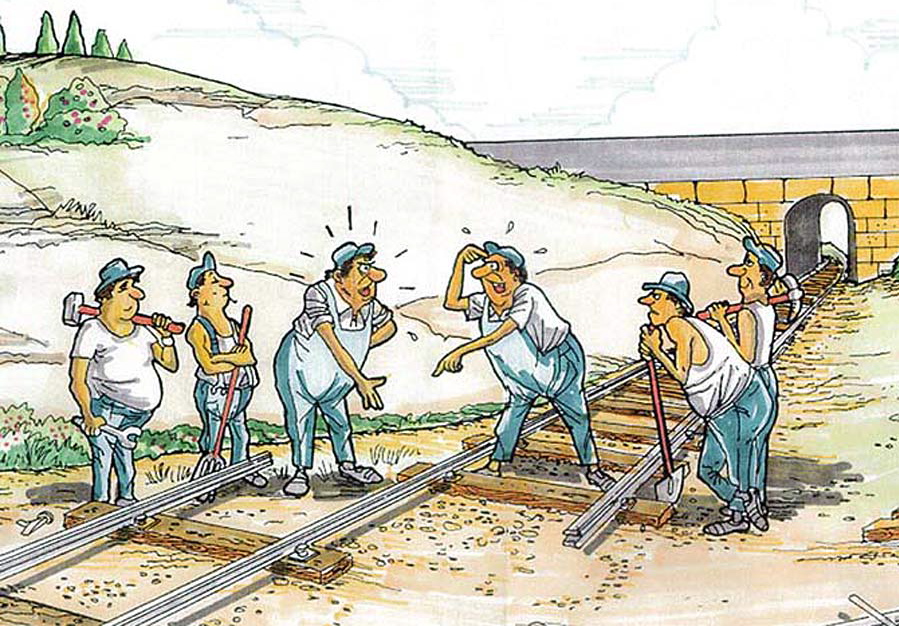 A group of my students were working on a team project, and were experiencing some problems getting their act together. Nothing too serious, just the sort of symptomatic problems that seem to get in the way of top-notch performance from team efforts.
A group of my students were working on a team project, and were experiencing some problems getting their act together. Nothing too serious, just the sort of symptomatic problems that seem to get in the way of top-notch performance from team efforts.
Why do we seem to have problems working together on teams? Everybody knows about Teamwork. In simplest terms, teamwork is working together with others to achieve a common goal. Look up teamwork in the dictionary and an additional element emerges. According to Merriam-Webster, teamwork is:
“work done by several associates with each doing a part but all subordinating personal prominence to the efficiency of the whole”
so there seems to be a requirement to sublimate egos in the pursuit of the team goals.
And, of course, all of the members of the team have to be working in a coordinated way to achieve an agreed upon goal, or the results can be disappointing, or worse….
Surprisingly, the word, “teamwork” hasn’t been around for all that long. The ancient Greeks and Romans had no word for teamwork. It first showed up in the English language in the 1820’s, from a simple combination of the words team and work.
Teamwork isn’t a concept limited to homo sapiens. Team-like behavior in the animal world is so common that Ken Thompson has fashioned the term bioteaming to describe the application of behaviors found in nature to the work of teams in human organizations.
There are countless examples of so-called symbiotic relationships in the animal world. The remora is a fish that attaches itself to larger fish like sharks, sometimes to whales, much like getting on a bus for easy transport through the oceans. The Egyptian plover is a bird that feeds on bugs and debris caught up in crocodile’s teeth – saves the croc a trip to the dentist while making dinner a thrill ride for the plover.
 Social insects like bees and ants demonstrate the importance of different actors playing out clearly defined roles. Wolves learn to hunt in packs, chasing down and overwhelming larger prey through coordinated attacks. Canada geese flying in formation trade-off the “lead bird” role; when the bird flying at the point of the V-formation begins to tire, it moves to the back and another bird moves up to take on the more tiring lead role. Even our canine companions sometimes work together to do what they couldn’t accomplish on their own.
Social insects like bees and ants demonstrate the importance of different actors playing out clearly defined roles. Wolves learn to hunt in packs, chasing down and overwhelming larger prey through coordinated attacks. Canada geese flying in formation trade-off the “lead bird” role; when the bird flying at the point of the V-formation begins to tire, it moves to the back and another bird moves up to take on the more tiring lead role. Even our canine companions sometimes work together to do what they couldn’t accomplish on their own.
Nonetheless, with all of the advantages that we have over bees, ants, birds, fish, dogs, cats, and other animals, we still have trouble forming and performing as teams. I think what may be needed is a way of looking at Teamwork as a concept that represents a set of values that encourage listening and responding in ways that provide support and cooperation, giving the benefit of the doubt, and making it as easy as possible for all team members to contribute as richly as possible to the team effort.
Over the years I’ve collected a set of guidelines or rules that can go a long way toward delivering strong team performance. The rules are personal and deal only with our own behavior, NOT what the other members of the team are doing.. That makes sense to me, since the only person’s behavior I can control is ME.
Now, I certainly don’t want to imply that I am in any way, shape or form a Paragon of Pure and Perfect Team Play. Too often I tend to act as if I am the only one who really knows what to do and how to do it. Arrogant and abrasive are adjectives that come to mind. Those who have worked with me can verify that. Regardless, I’ve seen that when I do behave like a good teammate, I can dramatically improve the chances that the team will perform well. I’m not ready to get out the hammer and chisel and engrave these rules on tablets of stone, but here are my Ten Commandments of Teamwork:
- Don’t make quick judgments about the capabilities or potential to add value of other members of the team, especially if they are negative judgments.
- Don’t be a smug, pompous, know-it-all ass. Help build a team, not your ego.
- Be open and trusting toward other team members if you want them to trust you.
- Be able to work with and learn with other people who will be thinking about things in different ways and at different speeds, than you are. Lots of people won’t be flying at the same altitude as you are. Accommodate them.
- Don’t argue. Stay off the soapbox, but don’t avoid confronting issues that arise. Find a non-argumentative way to get to the heart of issues without getting personal.
- Don’t give up and start flailing if things don’t work out well on the first attempt. Put your best efforts into every attempt. Don’t dwell on past successes or failures, beyond what can be learned from them. Live in the moment and make NOW the best possible now; then move on.
- Work hard to build a broad network of contacts; this will enhance the flow of information, which is the key to good decision-making.
- Acknowledge and share your personal agenda, but be ready to dispose of it if it’s not going to help move the team toward it’s goals.
- You can’t always pick you teammates, but never pick on them. Help them if you can, but don’t overdo it. Admit that you’re not always right.
- Keep a big picture perspective, but remember that, in the end, the down-to-earth details are what usually make the difference between success and failure.
What do you think?

Interesting and quite timely topic given the tremendous lack of Teamwork we see from our elected leaders these days!
I guess there are many factors that can contribute to a breakdown in teamwork – however, it’s been my experience that immense insecurity/low self-esteem seems to be one of the most prominent factors. All too often, the loudest, most brash and boastful are operating with a high degree of insecurity. This insecurity seems to fuel their actions that, sadly, detract from their ability to be productive team members. Their quest to prove themselves, if only to themselves, overpowers the teamwork process and usually leads to poor results… As a leader, I seem to spend an enormous amount of time working to mitigate the adverse impact caused by insecurity.
When personal agendas take over, the team always suffers. The truly sad thing is that insecurity and low self-esteem are never forced on anyone. People actually choose to feel/be insecure. How crazy is that?
I don’t know about that Dave… I think the sort of immense insecurity that surfaces within a group setting is rooted in something that runs very deep. So deep that a person may not actually be making a concious choice , but rather, reacting to what is hidden deep within. I am certainly not a schooled Psychologist by any stretch, however, I have observed via the people I have in my frame of reference, have often suffered from their earliest of days, of never being validated in any shape or manner. Who knows – perhaps their parents just weren’t equipped to deliver the sort of validation that could have prevented this sort of insecurity from ever taking root. Or, perhaps it’s something more… Every human being possesses a deep rooted need to be validated at some level. Some more than others. Where do we seek that validation? Even if we did receive a measure of it from mom and/or dad, in many cases it might not have been enough. All I know is that it is darn near next to impossible to be an effective and productive contributor in a team setting if you are not first comfortable with “yourself.” With your position in life. I contend that insecurity which manifests when one is attempting to prove himself/herself is born out of a lack of validation(acceptance) and indeed, may not be a choice one has made… Of course, I could be totally off-base here! 🙂
Joe, I’ll concede a few of your points. Insecurity can be deeply rooted. The “choice” to respond to inadequate validation from parents or authority figures may not be the result of a rational evaluation of possibilities. Nonetheless, lack of validation in early childhood is not determinative of adult insecurity. Many people who do not have loads of early childhood positive validation nonetheless find ways to become comfortable with themselves and lead happy, self secure lives. I surely don’t know why this happens, only that it does happen. I don’t think it’s luck. I think that, for some reason or another, some people choose to respond to events in healthier ways than others. Rather than argue about the level at which such choices are made – conscious or deeply unconscious — let’s agree that when teammates can band together and bond together around common aspirations, the relative level of insecurity of the team members becomes significantly less relevant. So, perhaps the real key learning in all of this as that the need for affilaition around a shared aspiration may, in fact, be the single most important component of team success.
What do you think?
Dave – I agree with virtually all you stated… I too know many people who might not have received healthy doses of validation from parents, or others who might have had the ability to positively influence them at younger ages… and yet, they found a way to rise above the repercussions that can cause. Don’t know if they are truly secure – or, if they simply found a way to effectively cope… But as you say, let’s put that aside and absolutely agree people coming together as one certainly mitigates any insecurities being felt by members of the team. Good stuff here Dave.
I am not sure that I agree with you that people choose to feel/be insecure. Insecurity can be the by-product of may things such as being put down by parents, peers or mentors. I think we can realize we have insecurities and make it a mission to overcome them but do not believe we choose to be that way.
The best book I have ever read for helping to put things in perspective is Eckard Tolle’s “A New Earth”. From it I learned to emotionally detach from difficult people whereas my typical ego response would be to get defensive. Now I try to look at them objectively and think “this is an interesting response”. Does not work all the time but I am getting better and it does help in group interactions.
For me, number four is the hardest as slow thinkers drive me insane. I also find the “trust” factor hard as, through experience, so many people interact with a personal agenda cleverly masked with compliments or helpfulness. What is the right balance between healthy skepticism and trust?
PS. Disclosure for this and all future posts…I can’t spell!
PPS. You are not arrogant or abrasive Dave…just direct. Too bad if people can’t handle the truth:)
Years ago I was a teaching assistant (TA) for two terms in a class on small group behaviour. We’d set up a group of students with a double task. Task 1: Make a 1/2 hour group presentation at the end of the term to the rest of the class on any topic you choose. Task 2: Notice what happens in the group as you strive to do Task 1 together. The “noticing” was augmented by lectures and a textbook on small group behaviour, by the TA’s observations and documented in personal journals. Both the journals and the presentation were evaluated pass/fail. Simple, right?
Evidently not. Usually chaos ensued, though sometimes at a slow boil. Doing the task and reflecting on it simultaneously (aka “mindfulness”) seemed to fuel the flames. Though the stakes were low, people fought, argued, bullied, strove for prominence, backed leaders or undercut them, created cliques, became “jokers” to relieve tension, ostracized individuals and sunk into emotional rabbit holes of anger, resentment, jealousy, worry, fear or what have your. I remember in one group a man would consistently cut off a woman whenever she tried to contribute. When she complained about it, he denied it. It wasn’t until we showed the video tape where he not only interrupted her verbally but reached across her line of sight while doing so that he understood what she was talking about and tried to behave better.
Now, you’d think that the groups who “managed” (read: “suppressed”) their conflict throughout the ten weeks would have the best outcomes. They didn’t. Their presentations were inevitably pedestrian, at best. The best presentations were made by the stormiest groups, so long as there was enough time for them to get through the storm. All that emotional energy would coalesce in the last few days into a creative, driven frenzy of activity. Group members suddenly trusted one another. They valued one another’s skills and contributions and pulled together effectively. And while other groups ended politely or with relief, these groups were genuinely disappointed that the team had to disband as the term ended. In other words, they considered themselves a team, not just a group of individuals.
This outcome was predicted in the textbooks, lectures and observations and the experience of many years of running this course.
Here’s my take. The stakes, in groups, are always high. Teams are forged in the fires of emotion, not formed from ideal pools of talent or roles. They require time to work through conflict and usually manage to do it themselves, though sometimes an appeal to a “mirror” like the video tape helps. Self-awareness (Task 2) both fanned the flames (as people tried to use the concepts to their personal advantage) and provided a way to talk about what was happening when they were ready to give up on the chaos and their own stake in creating it (usually because the deadline was looming). The “set up” (task, goals, evaluation, competition) beat knowledge every time: you can tell a group exactly what will happen and they will forget everything you predicted while they dive into the experience until you remind them again at the end. And, just as in Harry Potter, where the wand chooses the wizard, so it is in groups. The group chooses the role each person will play—leader, lieutenant, joker, bully/bullied, saint—depending on its needs at the moment, and will change these roles, too, as its needs change. No role need be permanent.